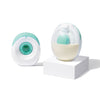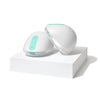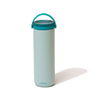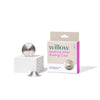A pediatrician and IBCLC (plus some Willow moms!) share helpful guidance for navigating this challenging time.
It’s normal to feel a range of emotions while your baby is in the NICU — anxiety, fear, overwhelm, and disappointment that your breastfeeding journey may be different than what you had expected.
While it’s true that you may not be able to nurse right away, and that NICU nurses will handle a number of your baby’s feedings, something you can do is pump! This is the best way to provide your newborn with critical nutrients and antibodies while also helping you establish your supply. Just as importantly, it’s something that will help you feel just a little more in control of a less-than-ideal situation.
Once your baby is home with you, pumping can also help you get through an initially difficult period. Latch issues are particularly prevalent among premature babies in the NICU, explains Laurie Jones, MD, IBCLC, and the Founder of Dr. MILK. Additionally, if they’ve been struggling with an illness such as RSV, they may simply be too weak to breastfeed.
Below, Jones is sharing more of her tips for pumping while your baby is in the NICU, and during those first few days and weeks back home. You’ve got this!
Tip 1: Do Skin-to-Skin
As soon as you can, try to get some skin-to-skin contact. Even if you can’t breastfeed, this will help establish your milk supply, and strengthen your connection with your baby.
Tip 2: Rent a Hospital Pump
Rent a hospital pump for your at-home sessions. When you’re visiting baby in the NICU, ask for another hospital pump — this way, you don’t need to lug anything back and forth.
Tip 3: Meet with an LC
Ask to meet with an LC at the hospital with the goal of helping your baby practice their latch and nursing at the breast when they’re ready. You can do this even if they’re bottle feeding a majority of the time. (P.S. You may need to advocate for yourself! Insist that you get this support — you deserve it.)
Tip 4: Get on a Pumping Schedule
Stay on schedule! Remember you will need to pump every 2-3 hours even though your baby is still at the hospital, so you’ll want to set an alarm — especially for overnight feeds.
Tip 5: Keep an Eye on Supply
Be careful to not pump too much and develop an oversupply of breast milk, which can lead to issues like clogged ducts and mastitis. This is something that a lactation consultant can help with.
Tip 6: Stock Up on Parts
Have multiple sets of pump parts so that you don’t need to wash them after every session. Overnight, have a milk cooler on your nightstand so that you don’t need to go to the kitchen, turn on the lights, and put your milk in the fridge.
Tip 7: Ask for Help!
Exclusively pumping is a lot of work. Make sure to enlist your partner or a family member for help with cleaning parts, labeling milk bags, and sticking to your schedule.
Tip 8: Take Care of Yourself
Resist the temptation to spend 24 hours a day in the hospital. Hospitals are bright, loud, and not very conducive to getting sleep, which you’ll need in order to show up for your baby and prepare for their arrival back home. As hard as it is, remember that your baby is in good hands in the NICU.
We’ll leave you with one last tip: give yourself grace! You’re navigating an incredibly challenging time, and your commitment to pumping and providing your baby with breast milk is amazing.
If you’re looking for a pump that’s hands-free, hospital-grade, built for more milk, and rated highly by moms (8/10 say it makes postpartum life easier), explore the Willow Go. You can also shop the Willow 360, our patented pump that’s 100% leak-proof in any position and compatible with self-sealing, ready-to-store bags (perfect for peace of mind when pumping on the go).Tags Used





